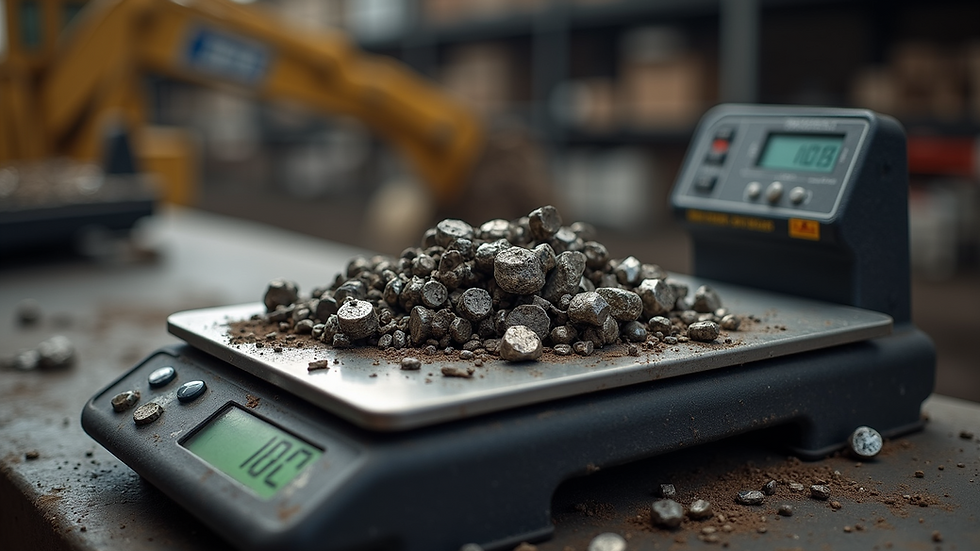Scrap Trading Centers Near You: What to Know
- Writer
- Oct 4, 2025
- 4 min read
If you have old metal, electronics, or other recyclable materials lying around, visiting local scrap trading centers can be a smart way to earn some extra cash while helping the environment. These centers buy scrap materials, sort them, and send them for recycling or reuse. Understanding how these centers operate and what to expect can make your experience smoother and more profitable.
Understanding Local Scrap Trading Centers
Local scrap trading centers are facilities where individuals and businesses can sell scrap metal and other recyclable materials. These centers play a crucial role in the recycling industry by collecting and processing scrap, which reduces waste and conserves natural resources.
When you visit a local scrap trading center, you will typically find different categories of scrap materials, such as ferrous metals (iron and steel), non-ferrous metals (copper, aluminum, brass), and electronic waste. Prices vary depending on the type and quality of the scrap, as well as current market demand.
How to Find a Reliable Local Scrap Trading Center
Finding a trustworthy scrap trading center near you is essential to ensure fair prices and good service. Here are some tips to help you locate a reliable center:
Check Online Reviews: Look for centers with positive customer feedback on platforms like Google or Yelp.
Ask for Recommendations: Friends, family, or local community groups may know reputable centers.
Visit Multiple Centers: Compare prices and services before deciding where to sell your scrap.
Verify Licensing: Ensure the center complies with local regulations and has the necessary permits.

What to Expect When Visiting Local Scrap Trading Centers
When you bring your scrap materials to a local scrap trading center, the process usually involves several steps:
Weighing the Scrap: The center will weigh your materials to determine the quantity.
Sorting and Inspection: Staff will inspect the scrap to categorize it and check for contaminants.
Pricing: Based on the type and weight, you will be offered a price. Prices fluctuate daily depending on market conditions.
Payment: Once you agree to the price, you will receive payment, often in cash or via electronic transfer.
Tips for Maximizing Your Earnings
Clean Your Scrap: Remove non-metal parts and dirt to increase the value.
Separate Metals: Keep ferrous and non-ferrous metals separate for better pricing.
Stay Updated: Monitor scrap metal prices to sell when rates are high.
Bring Identification: Some centers require ID for transactions.

What's the Highest Paying Scrap Metal Right Now?
The prices of scrap metals vary depending on global demand, supply, and economic factors. As of now, some of the highest paying scrap metals include:
Copper: Known for its excellent conductivity, copper is highly sought after and commands premium prices.
Aluminum: Lightweight and versatile, aluminum scrap is valuable, especially from cans and industrial sources.
Brass: Often used in plumbing and decorative items, brass scrap fetches good prices.
Stainless Steel: Durable and corrosion-resistant, stainless steel scrap is in demand for various applications.
Prices can fluctuate daily, so it is wise to check current rates before selling. Websites and local scrap trading centers often provide updated price lists.

Benefits of Using a Scrap Trading Center
Using a scrap trading center offers several advantages:
Environmental Impact: Recycling scrap reduces landfill waste and conserves natural resources.
Extra Income: Selling scrap materials can provide a steady side income.
Convenience: Centers handle sorting and processing, saving you time and effort.
Community Support: Many centers support local jobs and contribute to the economy.
Additionally, some centers offer pickup services for large quantities, making it easier for businesses and individuals to recycle efficiently.
How to Prepare Your Scrap for Trading
Proper preparation can improve your experience and earnings at a scrap trading center. Here are some actionable recommendations:
Sort Your Scrap: Separate metals by type and grade.
Remove Non-Metal Items: Avoid including plastics, rubber, or other contaminants.
Cut Large Pieces: Break down bulky scrap into manageable sizes.
Clean the Scrap: Remove dirt, grease, and other residues.
Keep Records: Maintain a log of your scrap sales for budgeting and tax purposes.
By following these steps, you can ensure a smoother transaction and better prices.
Exploring Online Resources for Scrap Trading
In addition to physical centers, many online platforms provide information and services related to scrap trading. These resources can help you:
Compare Prices: Check real-time scrap metal prices.
Locate Centers: Find nearby scrap trading centers with contact details.
Learn Best Practices: Access guides on sorting and preparing scrap.
Connect with Buyers: Some platforms facilitate direct sales to scrap buyers.
One such resource is the scrap trading center, which offers comprehensive information and tools for scrap traders.
Making the Most of Your Scrap Trading Experience
To get the best results from your scrap trading activities, consider these final tips:
Stay Informed: Keep up with market trends and regulations.
Build Relationships: Develop rapport with local scrap trading centers for better service.
Be Patient: Prices can vary, so wait for favorable market conditions if possible.
Practice Safety: Handle scrap materials carefully to avoid injury.
By approaching scrap trading with knowledge and preparation, you can turn unwanted materials into valuable resources.
Visiting local scrap trading centers is a practical way to recycle responsibly and earn money. With the right information and preparation, you can navigate the process confidently and maximize your returns. Whether you have small household scrap or large industrial materials, these centers provide an accessible solution for sustainable waste management.
.png)



Comments